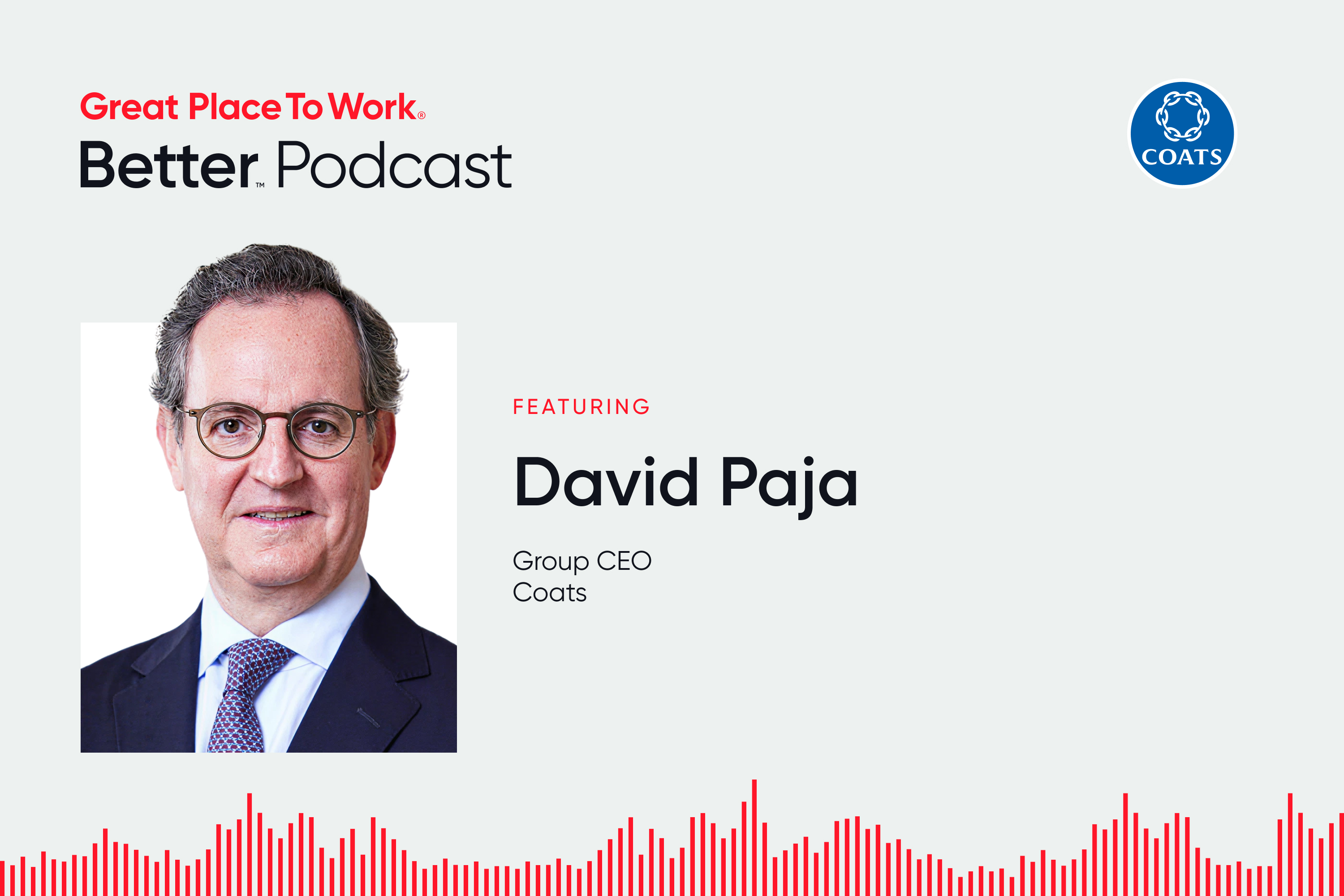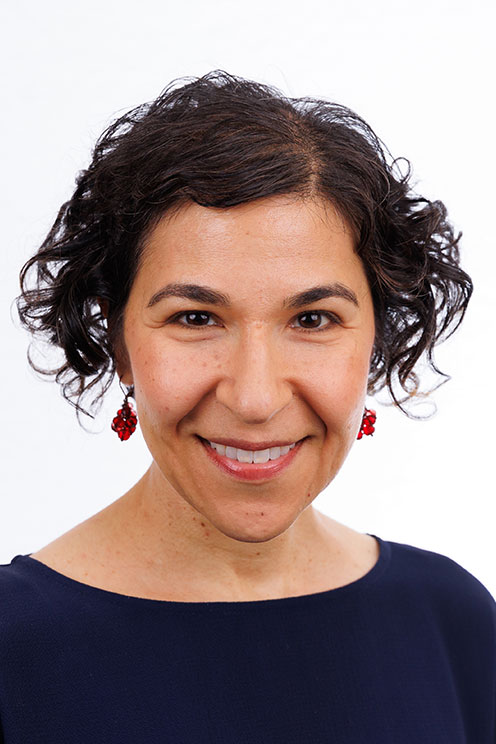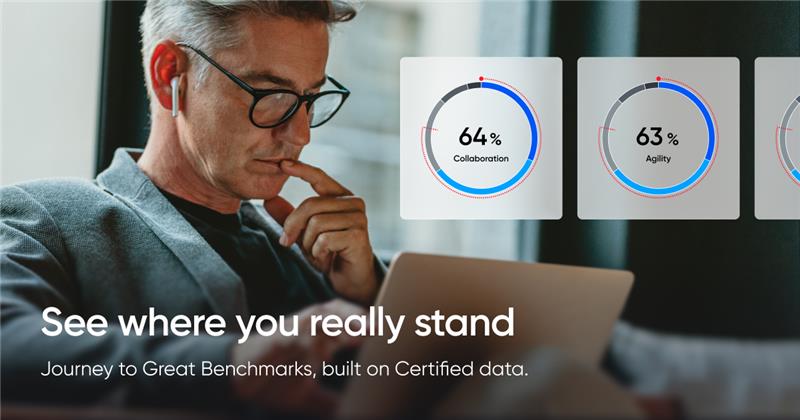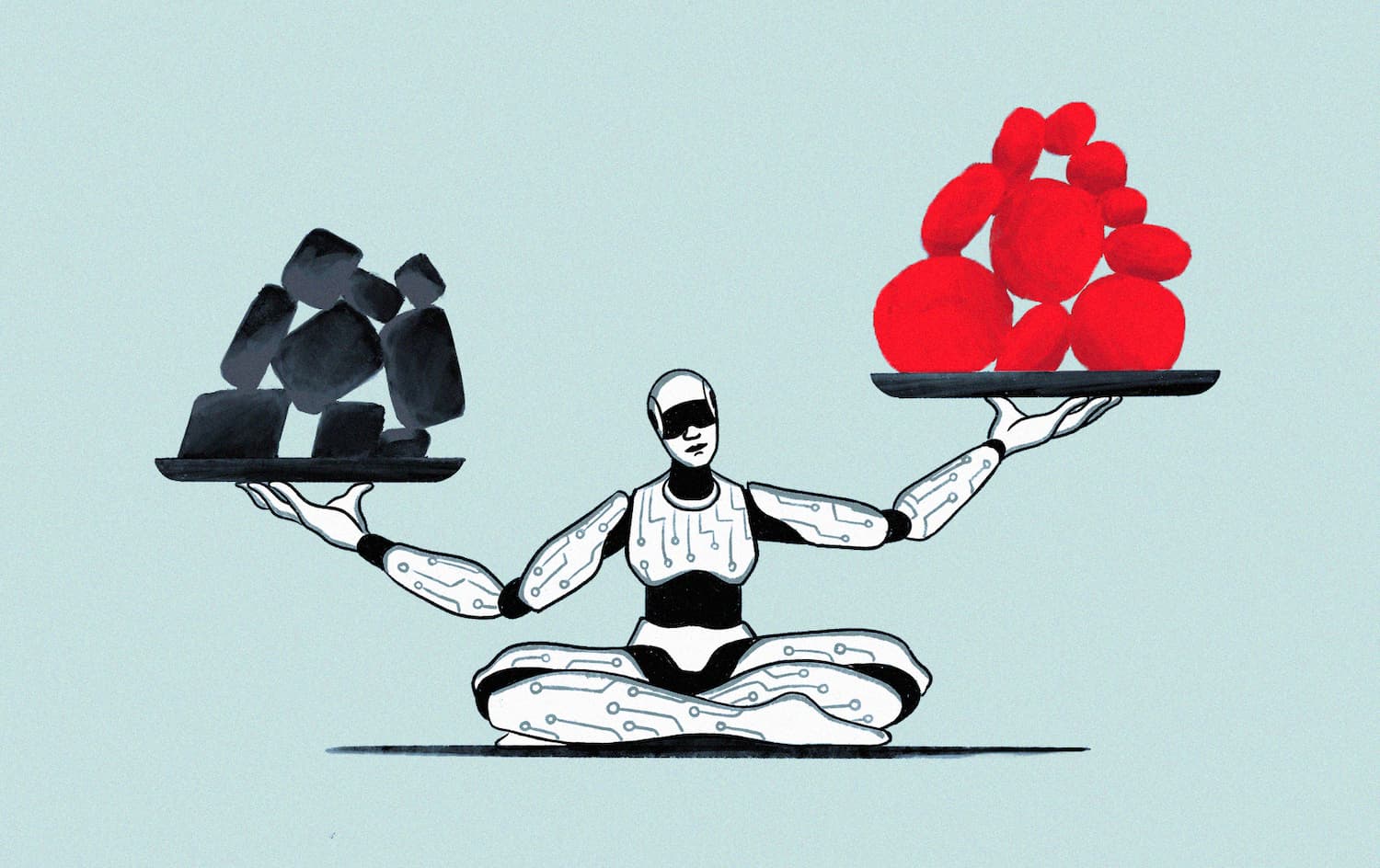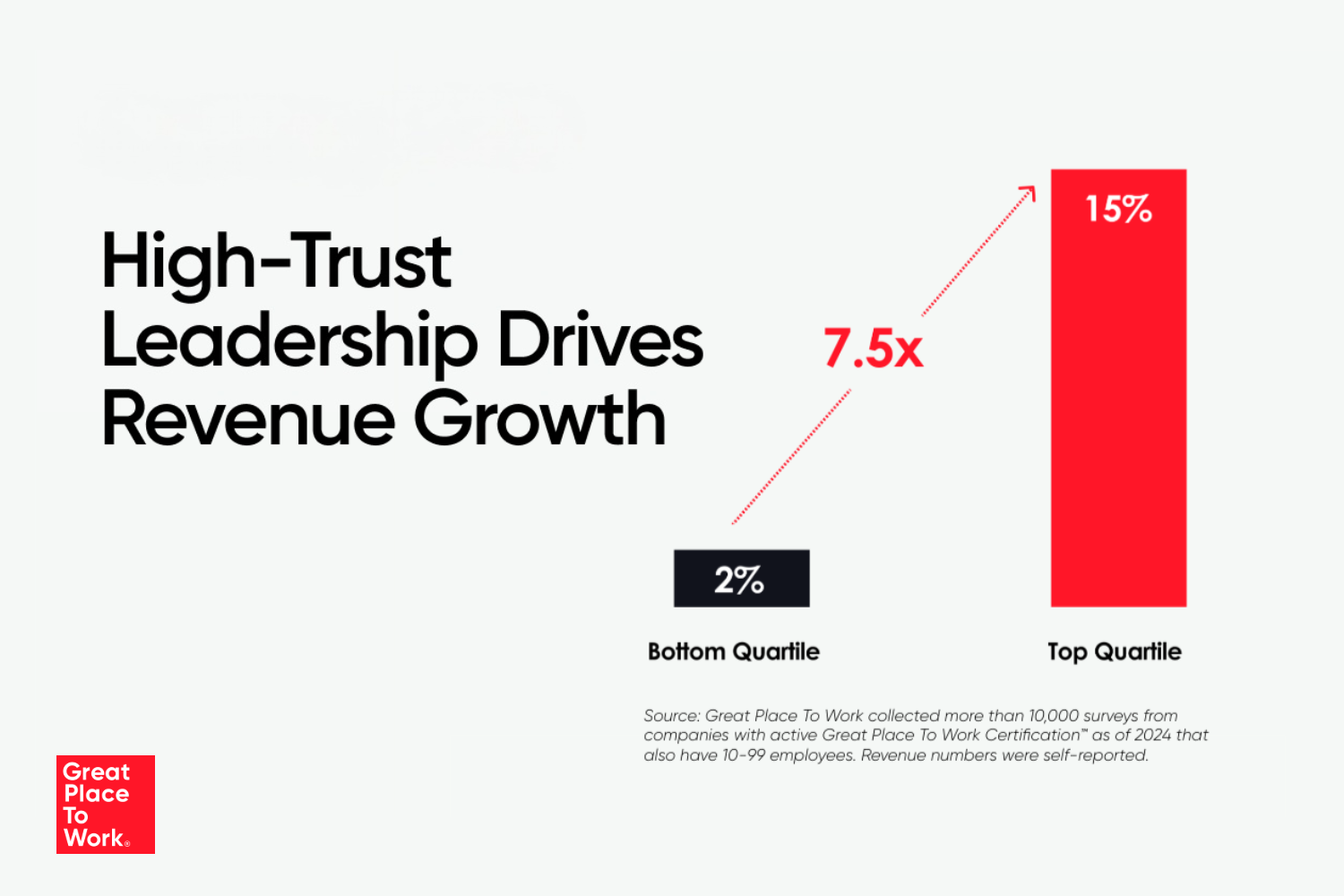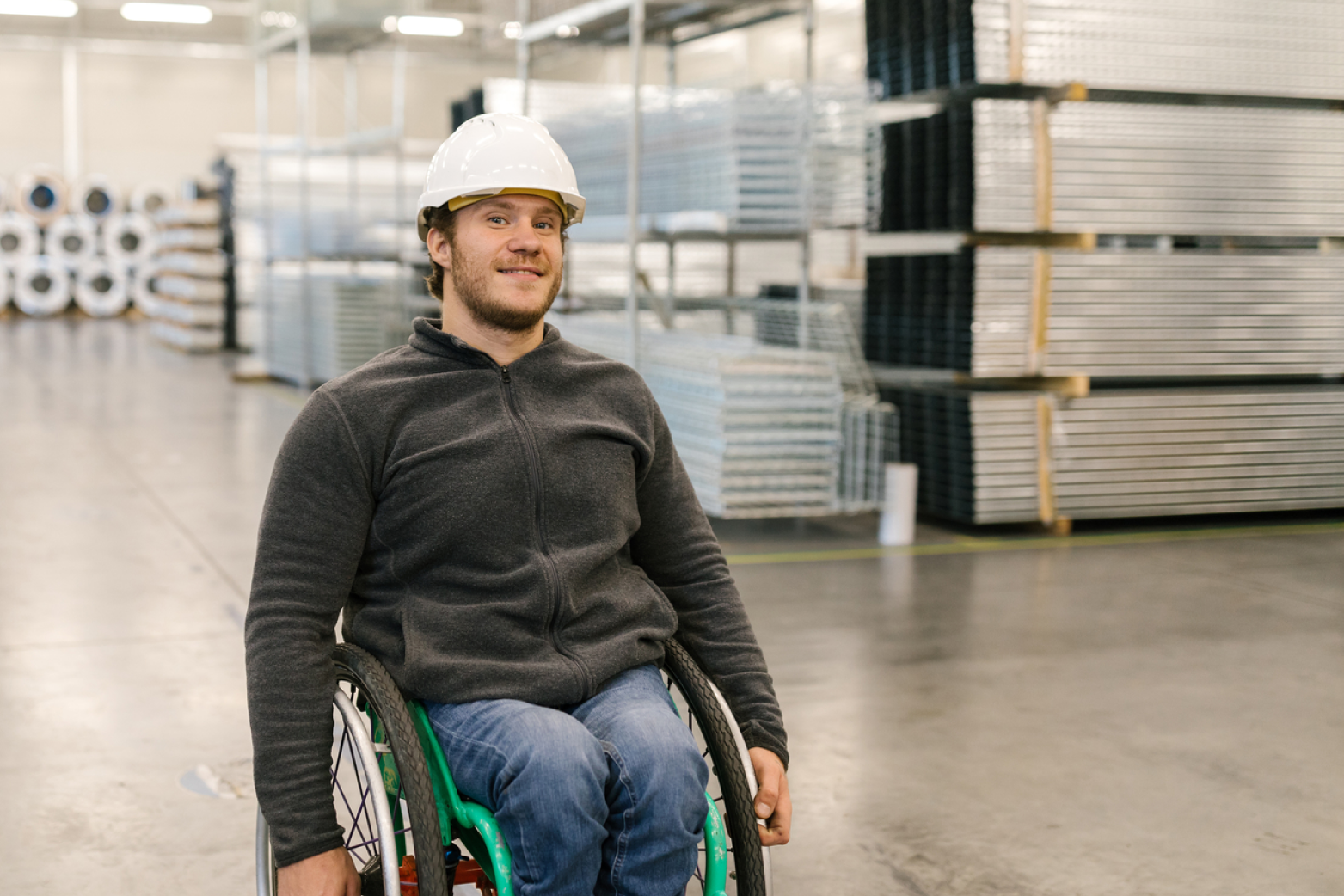Belonging, Employee Well-being, Innovation
David Paja, Group CEO of Coats, a 270-year-old global textile manufacturer, joined the Better podcast to talk about the high levels of well-being, psychological safety, and workplace innovation at Coats facilities, many of which are in remote, underdeveloped areas where working conditions can be inconsistent.
Coats operates in 55 countries and, despite cultural and geographic differences, has built a workplace where people trust each other, feel proud of their work, and are cared for. Now one year in as Global CEO, Paja noticed early on in his introduction to Coats that employees were happy and felt like they belong.
“Wherever you go, people demonstrate a real sense of belonging – the engagement, the alignment to our company purpose and strategic direction is probably the most remarkable thing,” he says.
He points to Coats’ commitment to excellence as one of the factors driving this sense of trust and community.
“At Coats, think world-class standards…clean, modern environments equipped with cutting-edge automated machinery and a strong emphasis on health and safety.”
Multi-generational loyalty
It’s clear that Coats puts people first, and this has been part of its culture for centuries. For example, in Turkey and India, Coats provides childcare at work, helping women balance their jobs and family life.
Coats’ deep-rooted legacy resonates profoundly in India, where it is considered an institution. “In India… five generations of the same family want to work for the same business. I mean, talk about retention … this is the ultimate measurement of success."
Coats' well-being levels are correlated with business growth and employee engagement, as proven by the data-backed Great Place To Work Effect.
A culture that inspires innovation
Coats has a long history of being an innovative company.
“Our thread was on Edison’s light bulb, and our thread was on the Apollo 11 mission to the moon – we've been in some of the most iconic applications, and that's not just by chance," Paja says.
Coats has more than four times the number of employees engaged in innovation, and that's because they're given opportunities to innovate; where they feel safe to try new things and learn from mistakes.
Coats fosters innovation through intentional action. “You create a little bit of an ecosystem that favors nurturing ideation and innovation,” Paja says. He emphasizes listening to employees as a cornerstone of this success. At Coats, almost 90% of employees say management seeks and responds to employee ideas compared to just 54% at an average company.
Creating psychologically safe space for innovation is integral to nurturing ideas: “It’s how we recognize leaders and leadership styles… making sure that people are not afraid of trying. It’s part of our culture, and we want innovation to happen at the local level… we want people to feel like they can develop all their ideas.”
Roula (00:18):
Welcome to Better By Great Place to work the Global Authority on workplace culture. I'm your host, Roula Amire, content director at Great Place to Work. David Paja Group, CEO of Coats, a 200 70-year-old textile manufacturer whose products are unfamiliar. Brands like Chanel and Lululemon joins me today. Coat facilities all over the world, including in remote, underdeveloped areas where working conditions can be dangerous. That's why what Coats does for its people is so remarkable. David talks about high levels of wellbeing, psychological safety and innovation at their facilities. These employees are thriving because of everything Coates is doing for them, proving it's not where you work, but who you work for. That makes all the difference. He also had some great career and life advice. We talked mentors, the power of being present and the importance of focusing on how you get a job done and not just on getting the job done. We also talked friendships. He has friends that go all the way back to kindergarten. I can certainly relate. My best PAL is from preschool. There's a lot in this one. Please enjoy. David, welcome to the podcast.
David (01:43):
Well, thank you for having me here.
Roula (01:46):
You became group CEO of Coats in September of 2024, so congratulations on being CEO of such an iconic brand. Coats is 270 years old. You're in many familiar brands like Lululemon, Nike, Adidas, Chanel, handbags. I'm probably wearing coats right now. Well, I don't have a Chanel handbag, but I do have this bag made of coats threading. So Coats is a manufacturing company of textiles for apparel, footwear and performance materials. You're in 55 countries across the globe and some of those facilities are in remote, underdeveloped communities where the pay is low and the working conditions can be dangerous. They're generally not workplaces where innovation and wellbeing thrive, but they are for coats workers and this is a very good thing. Levels of psychological and emotional health and work-life balance are really high. Since you joined the company, you've been to many coats, locations, including some in these more remote locations. Was there anything that stuck out to you that you saw or heard that was particularly memorable, especially being your first time going to some of these facilities?
David (02:59):
I would say a surprising thing is wherever you go, people receive you with a smile, which is a big thing to say because like you mentioned, we have about 20,000 employees around the world and many of those in remote areas. Like you said, developing areas and seeing the engagement, the feeling of belonging to the company, the alignment to the company purpose and strategic direction is probably the most remarkable thing.
(03:24):
The company has always been very people centered since its Creation Foundation 250 years ago, but you can see it in many ways. You see that in the way when you enter one of these factories, which tend to be very large factories, some of them with a thousand employees, some people think textile and they think kind of sweatshop somewhere lost in the middle of nowhere. Well, actually you enter into a world-class facilities where cleanliness, well a lot of equipment and automated machineries, you have a lot of focus on health and safety. So that's the first thing in the way we approach people. We want to make sure that our first priority is to keep them safe every day. Very high focus on personal protection, equipment safety rules, safety and standards, and that's a big priority. You sense, you also see a few things that are quite remarkable, which is about how you care about people also in a different way.
(04:16):
You care about their families and their development. A good example is we're trying to attract more female into our workforce, not only at the factory level, but also in leadership level. We've made great progress in the past few years and one of the things that struck me the most is in a couple of our sites, one was in Turkey, the other one in India, we actually have childcare on site, so we have literally nurseries on site for women that work for us and they have their kids and they can bring them along every morning and while they work, the kids are taken care of and these are not facilities that you look at them and you're saying, well, these are facilities for factory workers. I mean, I felt like I could perfectly leave my kids there. So it's that kind of quality of service that you provide and that's very remarkable.
Roula (05:06):
Let's go back to India for a minute, and as you mentioned, you're helping women get jobs For some of these women, this is the first job they've ever had out of the home. They're generally primary caretakers and daycare is an issue. And something I read that stuck with me was that there are, or there can be five generations of families working for coats in India. Some of the kids that are in these nurseries grew up to work for coats.
David (05:31):
Yeah, well, I mean we are actually an institution in India. Sometimes you go through a passport control when you land in India and when you say, oh, I work for coats and oh, you work for coats. So it is like a name that even people working at the airport they recognize. So we're quite an institution since so long. I mean you're talking decades and that's allowed us to have these kind of multi-generational situations where we have
Roula (05:57):
A legacy.
David (05:57):
Exactly, a legacy and that speaks how people see codes. There's a very strong family filling within codes. We talk about being a global company, but operating locally. So think global, act local. I personally think it's a great asset that five generations of the same family want to work for the same business. I mean, talk about retention. I mean this is the ultimate measurement of success.
Roula (06:20):
We mentioned a couple of things, one of which is you want to keep your people safe safety measures, but wellbeing goes beyond that at Coates and more holistically, why is it important to support employees and their families no matter where people live or what they do? Many companies just focus on supporting their employees and not always their families or not always the communities they live in. What does this do for the company, for the success, for the business performance of the company?
David (06:47):
Well, I'll start by saying that over. If I look at the recent Passover the past 10 years, the company has done very well. If I think at a financial level, we've tripled our share price and we have substantially improved our financial results. But in my view, this is something that is strongly correlated to the way we think about people and the way we think about their contribution. We have 20,000 people working for codes. This is my personal belief, but it's been the company's belief as well. Every single person makes a difference. The tree in becoming a great company is making sure that we get the most out of every single individual in terms of what they can contribute and how much they can grow for themselves. So it goes both ways. It's not only what they do for the company, it's what the company does for them.
(07:34):
What we've done in the last few years is build out of extraordinary best practices locally. We've built global programs and we've taken some of those practices that were local for a long time. We've taken them globally and we've wrapped it around the programs like the one we call Energy for performance, which is about making sure that people come to work every day fully energized and energized means for us that they feel physically well, mentally well, emotionally well, socially well. So we have multiple dimensions and we try to take care of all those things. That's why we have programs that go from making sure that people are physically safe to creating opportunities for them to also develop social interaction and that makes them more tied emotionally also to the business. And this results in fantastic, like I said, financial results for the business, but also it results in that level of retention and loyalty that is extremely valuable.
Roula (08:31):
That was just the stat I was going to cite. Nine out of 10 employees want to stay in their jobs long-term, including in areas where people at a typical workplace aren't having a good experience. Your revenues up, organic growth is up, employee engagement has increased. All these things are on the rise as your wellbeing levels are also on the rise. So we know there's a strong correlation there. Why is putting your people first? The most competitive business advantage companies can have no matter their industry or where they're located or what they do.
David (09:01):
The biggest capital that you have in a business is people, is human capital. I look at it as you have the potential of 20,000 people ideating, generating new ideas, improving things, coming up with ways to do better to serve our customers better. So you think about that ultimate potential is 20,000 individuals at their best within codes and how do you get there? So it's obviously a journey. Think of return on investment, that's a much bigger return on investment than when you do capital in a machine. You are talking about investing in people to get the full potential of 20,000 people working for the business. That's amazing. They generate innovation and they improve the customer service and that results in faster growth and then it's a virtual circle. So I truly believe that's the foundation of any great business.
Roula (09:51):
Well, let's talk about innovation. The fact that most of your people in these remote locations have such high levels of innovation proves that leaders can create innovative cultures anywhere in the world. Our research shows that compared to the typical global employee experience, coats has more than four times the number of employees engaged in innovation, and that's because they're given opportunities to innovate, to share ideas no matter who they are or where they work, and that drives more revenue. What would you say to a leader who says to you, I wish my employees were more innovative, what advice would you give them?
David (10:28):
Okay, so first I will just kind of give a couple of data points around code as an innovative company. Our thread was on Edison's light bulb and our thread was on the Apollo 11 mission to the moon. So we've been in some kind of iconic, I would say, applications, and that's not just by chance. Now innovation is largely driven by culture, but I mean a piece of it is obviously supporting innovaation and as an example, we've over time we've developed the ainnovation hubs in some of these locations in India, in China, in Turkey, we have three important innovation hubs where we do innovation around sustainability, performance, et cetera. So part of it is investment, but a big part of it is how people develop a culture where they are not afraid of trying, even if they fail, where they feel comfortable taking risks, where they feel that what they say is going to be listened to and that good ideas wherever they come from are going to be taken and developed.
(11:27):
I think you've given the stat, right? Four times. I mean, people at codes feel four times more supported in terms of creating new ideas than in the average company, and that's the result of this thing, global Act local, helping people get to their full potential, which starts with making sure that they can energized to work, that they're listened to and that their ideas are developed. It's a combination. You create a little bit of a, it's difficult to say there's one single thing. You create a little bit of an ecosystem that favors nurturing, ideation and innovation.
Roula (12:04):
Yeah, so I think one of the takeaways I just heard is to an executive that says, I want my employees, I wish they were as innovative as yours. For instance, David, you are saying you would encourage them to listen to them. Almost 90% of your people say management seeks and responds to employee ideas compared to just 54% at an average company. So I think those numbers are benchmarks to why and how listening makes a difference. People feel heard, they can voice a suggestion that's going to lead to a great innovation.
David (12:34):
Exactly. Exactly. So I think you've said it right, and it's how we recognize also leaders and leadership styles and how we basically support that in a way, that feeling of entrepreneurship and that we want to encourage locally and not making sure that people are not afraid of trying. It's part of our culture, but it's something we want to happen very, very locally because at the end of the day, we want people to feel like they can develop all their ideas
Roula (13:03):
And that gives them pride and purpose in what they do and where they live.
David (13:07):
Exactly, exactly. I mean, that's a huge thing for them. I mean, if you think of you take care of them, that's the first thing. You make sure that they come to work energized and second, you help them develop their ideas. Then that builds into that kind of trust in management, pride in the company, and when you put trust and pride together, then great things happen. People really are excited to come to work every day
Roula (13:28):
And then five generations later they're doing that. Hey everyone, if you like listening to the podcast, then don't miss the Great Place to work for All Summit in April in Las Vegas where you will learn from the best in the world, meet more than 1500 leaders and get insights on what the data says drives business success, and that is people and culture. I promise you. Leave inspired and ready to transform your workplace. Use the code better to save 20% off registration link, ENC coder in the bio. Don't miss out and I'll see you there. We have talked about wellbeing today. How do you create a sense of wellbeing for yourself personally, especially in this new big role?
David (14:25):
So I've been running global businesses for quite some time, at least for more than a decade, and obviously these are demanding jobs in terms of traveling and the talent and so on. I try to stay very disciplined because just like anybody else, if you don't feel high energy when you get to work, because if you're exhausted or tired, you are not at your best, and it's important to, in my view, for everybody, no matter what level, it's important to feel with a high level of energy every day. So in my case, I try to protect three times per week exercising. So that's kind of something that I'm quite religious about and planning my time, making sure that I'm not back to back every single, single day and trying to have some breathing space to just relax and step back and think. So that gives me balance as well.
(15:14):
On a personal note, apart from work, I like to spend time with my family, but also with old friends. Sometimes when you're in a job like a CEO of a global company, you are a little bit in that bubble of everybody looks at you as, okay, you're a CEO of this company. I like to connect back with friends that have known me from many, many years ago. It gets you more grounded and it gets you out of that bubble and well, some people actually say that about my wife as well. They say, well, you're lucky to have the wife you have because she gives you grounded all the time. You need to have time to live outside of the bubble that sometimes a title or a role can put you into.
Roula (15:48):
Yes, yeah. Time to just be you.
David (15:50):
Exactly.
Roula (15:51):
How old are your oldest friends in terms of how long you've known, known friends? Are you going back since grade school or college or
David (15:58):
Even back to kindergarten? So I have, it's unbelievable, but probably my best friend and we're still in regular contact. We went to kindergarten together, went to school together, then we went to engineering school together. People always tell me that, I mean, you keep your friends from different phases of your life all the way back to we always have these gathering of the friends that went to school together, gathering of the friends that went to universities together, and I tried to keep those contacts, and like I said, that's part of grounding you again into your core values and who you are, and it helps you also. I mean, that's part of wellbeing as well, right?
Roula (16:33):
Oh, a hundred percent. Yeah. Yeah, definitely. If you could go back and give your younger self advice, what would it be?
David (16:42):
Probably if I had to give my younger self advice is even in your first years, I think it's okay. It's good to focus on what you're trying to achieve, but focus on understanding yourself, how you achieve things and your leadership style and reflect on that as certainly as possible in your career. I mean, there's always kind of this discussion of when you're in a CEO role or in a leader role, there's four angles or four sides to that role, so you talk about you have to be a thinker, you have to be a warrior, you have to be a dreamer, you have to be a lover in the sense of taking care of people, and basically this is like a toolkit. You have four sides of yourself that you need to utilize in different situations when you are young in your career in particular, you tend to focus a lot on the doing and the achieving, which is more of you exercise a lot of your thinker and maybe a lot of your warrior side,
(17:32):
And I think it's very good to reflect on early on and how you need to use all sides of your capabilities and how you balance them according to the situation. Building self-awareness, understanding areas that you need to further develop or use more often, understanding what makes people tick as well, because understanding how people think and different people. So over time, I've spent more and more time really thinking about these things because when you try to get things done through people, you really need to understand how do you touch a key point that is going to get them going, and how do you handle difficult situations with empathy? How do you go through things like COVID crisis a few years ago? How do you keep people motivated? How do you get people excited about the future? That's something I've developed much more later in my career in terms of developing much more self-awareness in those topics, and it's something that I would probably say maybe early in your career, maybe think about those things a bit more. That's something that I think help you also with your progression,
Roula (18:30):
But I'm sure people didn't mention that, right, that wast advice you would get. I think leaders are groomed to do and achieve and exercise the other sides more, and hopefully maybe with the next generation it's more of the balance.
David (18:43):
Yeah, I think in that sense, mentorship is quite important because you're right. I think there's this thing of everything is about results, but at the end of the day, if you pick the right mentors, you can be guided into some of these kind of discussions. I'm thinking early on I was quite blessed as well along my career to have first some formal mentors because I worked for big companies like Honeywell where you have very good mentorship programs. I learned to develop informal mentorships, and that's something that I would also advise anybody at a young stage of their career. You don't need to be appointed a mentor, just look around you, who are the leaders that you admire, people that you can reach out and say, Hey, would you mind maybe having a chat with me every month? And then we talk a little bit about, so they can give you a perspective on things that can be extremely useful. So you get this almost intergenerational coaching that is part also of where things are going because at the end of the day is how do you pass knowledge from one generation to another when basically also lifespans are expanding, people are working longer. How do you make sure that the wealth of experience is valued and then fed into the younger generations in a way that makes them better faster and so that they feel more realized as well?
Roula (19:55):
Yeah. Did you want to be, when you grew up, did you have a dream job or a dream career?
David (20:02):
So we always joke about that because one of my closest friends, I was actually with him on this last weekend, but we went together to high school. He was still joking about that. He said, well, 25 years ago, you said, oh, I'm fine with the job I have. I'm a manager, whatever. I really love my job. Then you were promoted into a, what was that, like a VP job, and you said, I'm fine as a VP and I'm perfectly fine. I'm going to stay here, and then you were promoted to a president job and then from there to a CEO job. I was always enjoying every single thing I did. I never had this kind of view of, okay, this is a step to get to a goal that is, what do you want to be in 10 years or how far do you want to get in your career? I think it was Satya Nadella who mentioned that don't wait for your next job to do your best work, which is I think a very good way to look at it because you need to focus on doing your best at what you're doing today,
(20:53):
And when you do that, then opportunities happen, and I've always been very focused on look, enjoying deeply what I'm doing and doing it the best that I can. That led into new opportunities and it led into CEO level jobs that quite frankly, when I was younger, it was not on my aspirational list. It came maybe as a consequence of doing things in a certain way and jumping into opportunities and enjoying the challenges and taking chances and doing well performing, but it was not by design that I was always dreaming of getting to that level.
Roula (21:28):
When I asked that question of what advice would you give your younger self, other guests have said things that you have practiced, which is be present, enjoy where you are, don't look ahead, be curious, take risks, and that certainly has paid off for you.
David (21:41):
Probably the one that I would say, and that has paid out for me, that also applies to family time. Sometimes when you are young, you are with family less, you are thinking about work, so this kind of be here now principle, which is, look, you may not have as much time as you would like with your family when you are in certain phases of your career, but whatever time you have, it has to be quality time, so don't have your mind thinking about work when you are with them. So this be here now, I actually have kind of a tag on my desk that says, be here now so that when I'm home, then it reminds me, okay, it's family time, so don't get distracted.
Roula (22:18):
Yeah. Is there a book or a podcast you would recommend to your peers?
David (22:22):
There's a book that I read recently, and it's a classic team of rivals, is the one on Abraham Lincoln and is from Doris Goodwin. What I liked about that book, I mean it's pretty thick and long, but is the leadership style. How do you build a team, high performance team with your rivals to the job that you are in? How do you bring them into your team? How do you manage that team with low ego approach, with incredible level of emotional intelligence through incredibly challenging times, in particular the Civil War, the American Civil War? It's amazing to see that exceptional leadership style. So that's a book that really impressed me. Then, I mean, like I mentioned before, I loved reading things about the brain around artificial intelligence just to be contemporary.
David (23:09):
There's
David (23:10):
A book that also I enjoyed a lot called A Thousand Brains. I think the author is Jeff Hawkins, I believe that's the author. That's a really interesting book about in the last few years. There's incredible progress in understanding how the brain works, which has a lot of implications to our future in everything. I'm just passionate about that. I think that curiosity of learning and reading about different things is quite fascinating, so I encourage everybody to read.
Roula (23:38):
Yeah, that's a great tip. Thank you for all your tips and your insights. David, it was a pleasure to have you on.
David (23:43):
Well, thank you so much for an invitation. It's been a pleasure to be a part of this.
Roula (23:49):
Thanks for listening. If you enjoy today's podcast, please leave a five star rating, write a review, and subscribe so you don't miss an episode. You can stream this in previous episodes wherever podcasts are available.


